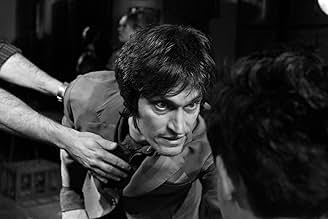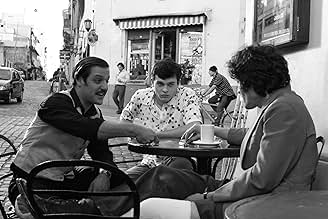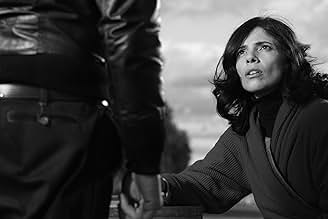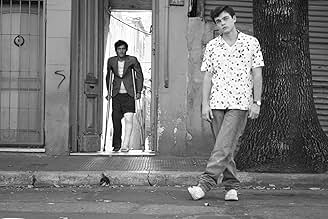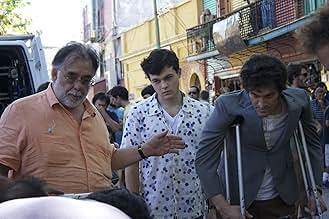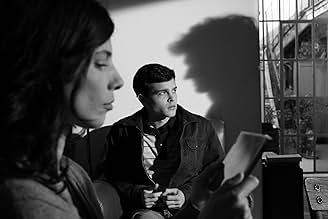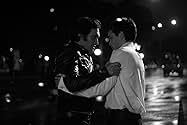VALUTAZIONE IMDb
6,8/10
14.117
LA TUA VALUTAZIONE
Bennie si reca a Buenos Aires per trovare il fratello maggiore scomparso da tempo, uno scrittore un tempo promettente che ora è solo un residuo di se stesso. La scoperta potrebbe aiutare a c... Leggi tuttoBennie si reca a Buenos Aires per trovare il fratello maggiore scomparso da tempo, uno scrittore un tempo promettente che ora è solo un residuo di se stesso. La scoperta potrebbe aiutare a comprendere il loro passato e il loro legame.Bennie si reca a Buenos Aires per trovare il fratello maggiore scomparso da tempo, uno scrittore un tempo promettente che ora è solo un residuo di se stesso. La scoperta potrebbe aiutare a comprendere il loro passato e il loro legame.
- Regia
- Sceneggiatura
- Star
- Premi
- 1 vittoria e 6 candidature totali
Rodrigo de la Serna
- José
- (as Rodrigo De La Serna)
Erica Rivas
- Ana
- (as Érica Rivas)
Sofía Gala Castiglione
- María Luisa
- (as Sofía Castiglione)
Recensioni in evidenza
17 year-old Bennie works as a waiter on a cruiseship. When the ship suffers engine difficulties and docks in Buenos Aires, he uses the opportunity to attempt to reconnect with his estranged brother Tetro, a once promising writer. He is welcomed with open arms by Tetro's girlfriend, Miranda. She longs to know the truth behind her boyfriends past and what made him the misanthrope he is today. Tetro is hostile towards his brother, his plan was to never see any of his family again, and so keeps him at arms length. Bennie discovers an incomplete play, written in code whilst his brother was undergoing psychiatric treatment. He decides to finish the play and enter it in a festival run by Argentina's most powerful critic, Alone. Faced with this upheaval, Tetro is forced to come to terms with his relationship to his younger brother and his father, a famous conductor.
Tetro is, at its core, a film about family, in particular the relationship between brothers and their Father. A theme Francis Ford Coppola has immersed himself in before, most notably in The Godfather and Rumble Fish. Through a series of flashbacks we are given a glimpse of major events in Tetro's youth, his relationship with his father (played by Klaus Brandauer) and his subsequent departure. There are huge family secrets known only to Tetro and revealed to Bennie in an ending which echoes great literary and operatic works. Coppolas love of opera and theater is stamped all over the script and the city of Buenos Aires seems to be the perfect background in which to set this story.
Shot stunningly in digital monochrome with colour flashbacks, it has some aesthetic similarities to Rumble Fish. Coppola and cinematographer Mihai Malaimare Jr. reportedly site On The Waterfront and La Notte as big influences on the films visual style. There are certainly elements of both here, with the film also retaining its visual sense of self. It is operatic in both its narrative and its mise-en-scene. The idea of cutting between colour and monochrome as well as changing aspect ratios sounds as if it would be jarring, and it typically is. But for the purposes of Tetro it works perfectly.
Seen as a controversial choice by some, Vincent Gallo brings an edge to the titular character that some other actors may have lacked. However it is newcomer Alden Ehrenreich who steals the show as Bennie, a wayward teenager looking for guidance and approval. Maribel Verdu, as Miranda, provides the conduit between the two in a typicaly solid performance.
Hollywood is littered with once great directors who have fallen from grace, which makes Tetro all the more remarkable as a return to form from one of the greatest, Francis Ford Coppola.
Tetro is, at its core, a film about family, in particular the relationship between brothers and their Father. A theme Francis Ford Coppola has immersed himself in before, most notably in The Godfather and Rumble Fish. Through a series of flashbacks we are given a glimpse of major events in Tetro's youth, his relationship with his father (played by Klaus Brandauer) and his subsequent departure. There are huge family secrets known only to Tetro and revealed to Bennie in an ending which echoes great literary and operatic works. Coppolas love of opera and theater is stamped all over the script and the city of Buenos Aires seems to be the perfect background in which to set this story.
Shot stunningly in digital monochrome with colour flashbacks, it has some aesthetic similarities to Rumble Fish. Coppola and cinematographer Mihai Malaimare Jr. reportedly site On The Waterfront and La Notte as big influences on the films visual style. There are certainly elements of both here, with the film also retaining its visual sense of self. It is operatic in both its narrative and its mise-en-scene. The idea of cutting between colour and monochrome as well as changing aspect ratios sounds as if it would be jarring, and it typically is. But for the purposes of Tetro it works perfectly.
Seen as a controversial choice by some, Vincent Gallo brings an edge to the titular character that some other actors may have lacked. However it is newcomer Alden Ehrenreich who steals the show as Bennie, a wayward teenager looking for guidance and approval. Maribel Verdu, as Miranda, provides the conduit between the two in a typicaly solid performance.
Hollywood is littered with once great directors who have fallen from grace, which makes Tetro all the more remarkable as a return to form from one of the greatest, Francis Ford Coppola.
Thousand of miles away from Hollywood, the great Francis Coppola confronts something personal as a human being as well as a filmmaker. The story a young man looking for his older brother under the crippling shadow of a famous father. Hummm. Compelling, absorbing, mesmerizing at times. The younger brother is played with real magic by newcomer Alden Ehrenreich but for some inexplicable reason the older brother and title role is played by Vincent Gallo. He's an interesting guy but not at all the pivot that, clearly, the part required. I needed to feel things that Gallo didn't provide. He's just weird and even in the enormous emotional scenes (like the final one) he's not really there. I wonder why Coppola made this bizarre casting decision. The rest of the cast is fabulous and Buenos Aires breaths a life of its own even if, it didn't feel like Buenos Aires - I know that city pretty well - it looked at times like a border town in Mexico. Buenos Aires has an old fashion, seductive kind of elegance nowhere to be found here. I'm sure there is reason for it and I hope to discover it in my next viewing because this is a film I know I'll see many, many times. Another thing to cheer about, a strange and haunting score (it reminded me of "Apartment Zero" in more ways than one) and a sensational black and white Cinemascope screen. To be seen!
For Francis Ford Coppola, the last forty years have been an uphill battle, not only with critics but also against an adoring public who have held him to the highest of standards since such masterpieces as "The Godfather" and "The Godfather: Part 2", both having brought home Best Picture Oscars and garnering best Director nods, the latter presenting him with the win. Films like "One from the Heart" and "Peggy Sue Got Married" make even his most hardcore of fans wonder, "What the hell is going through this guys freakin' skull?" Can directors truly lose their finesse? Can these just be metaphorical ruts like we've seen from the recent string of M. Night Shyamalan disasterpieces? What's the exact percentage ratio of wine from Coppola Vineyards that he consumes to that of which he produces? I digress. Now two years after the mediocre "Youth Without Youth", Coppola churns out "Tetro", a small little self authored Indy film that may just be the one he needs to regain credibility in the eyes of his audiences. The question is
does he pull it off? Bennie (Played by fresh face Alden Ehrenreich) has traveled to Buenos Aires to re-connect with his estranged brother (Vincent Gallo, Buffalo 66') who now goes by the name of "Tetro". Upon his arrival, he is greeted by the gorgeous Miranda (Mirabel Verdu), Tetro's girlfriend, who graciously invites him to stay at their home against Tetro's own reservations. It doesn't take long before Bennie begins to realize that his long lost brother is not the person he once was, but rather an on edge, manic and short tempered poet. "When I met him," says Miranda, "he said he was a writer. He held everything he ever wrote against his chest." As the story unfolds absolutely nothing is what it appears to be and when Bennie gets his hands on one of Tetro's unfinished plays, he finds out that the true story of his family holds secrets darker than he could have ever imagined.
Simply put, "Tetro" is Francis Ford Coppola's reinvention back into "quality" cinema and a perfect example of the wonder that can be achieved when a Director is in control of practically all creative aspects of his work. Don't be mistaken, if you're looking for the Coppola from the 70's, he's long gone. This new Coppola has been reborn, emerging as someone quite different. Funded entirely through revenue from his private vineyard, he's created one of the most stylistically atmospheric black and white films that I've seen in recent memory. One can't help but feel that there are heavy influences by the great Italian filmmaker Federico Fellini throughout, especially through the incorporation of operatic high drama and scenes that feel all too autobiographic to be dismissed as pure coincidence. In addition, there is a subtle Noir accent which is credited to Mihai Malaimare's gorgeous cinematography. Coppola is now, a true Indy, non-conformist filmmaker and my gut tells me that he really doesn't care. Instead, he doesn't give it all away, but rather does an exceptional job of keeping the motives, feelings and details about his characters well hidden for the longest possible duration of time until it is inevitable for such crucial facts to be revealed solely to aid the plot.
Mainstream audiences may just come to hate Tetro. It has an overall "artsy" coat to it that many of today's average moviegoers may not be able to get past. This includes extended, sporadically placed dance sequences from Powell and Pressburger's celluloid Opera "The Tales of Hoffmann" as well as original ballet numbers which are used to convey character emotions and cleverly emphasis certain themes. That said, foreign film aficionados, especially those of such Directors as Giuseppe Tornatore or Michael Radford, will be delighted with Coppola's knowledge of the Genre and passionate homage to those who have coined it. Through the script, he is precise and very careful with what he chooses to include as well as place importance on. With many scenes purely dialogue driven, he is a master of building tension without having to rely on the support of quick cutting, action or special effects to drive home his points.
Actor Vincent Gallo, in one of his first non-self Directed/self written films, fits comfortably into the role of Tetro. His narcissism (which I believe is in fact also grounded in his real life) brings life to the part and he's believable straight up to the films shocking conclusion. There is a certain vulnerability and a hurt that Gallo also manages to convey which is really what makes Tetro such an interesting character to watch on screen. Newcomer Alden Ehrenreich has a look matched by the likes of Leonardo DeCaprio, and certainly has the acting chops to pull it off. There is a definite star appeal about him that seems to emanate naturally which will certainly cause him to gain more roles and credibility as a performer in the future. Mirabel Verdu is absolutely stunning as Miranda and gives off a "Sophia Loren" type elegance, a role that rounds out the feeling that what we're experiencing is in part truly a charming foreign film coming out of what was once a mainstream filmmakers body.
Tetro is a testament to the fact that an artist can pick himself up over the course of decades and learn from his failures as well as his successes. Francis Ford Coppola's recent work is bold, daring and symbolizes his true love for the medium. At its heart you can see that the characters, story and attention to even the most minor of details are shown so much love and care that they could only be executed by a passionate and dedicated creative mind. My only regret after seeing Tetro is that more people will turn down the opportunity to open their eyes and experience it for themselves.
Simply put, "Tetro" is Francis Ford Coppola's reinvention back into "quality" cinema and a perfect example of the wonder that can be achieved when a Director is in control of practically all creative aspects of his work. Don't be mistaken, if you're looking for the Coppola from the 70's, he's long gone. This new Coppola has been reborn, emerging as someone quite different. Funded entirely through revenue from his private vineyard, he's created one of the most stylistically atmospheric black and white films that I've seen in recent memory. One can't help but feel that there are heavy influences by the great Italian filmmaker Federico Fellini throughout, especially through the incorporation of operatic high drama and scenes that feel all too autobiographic to be dismissed as pure coincidence. In addition, there is a subtle Noir accent which is credited to Mihai Malaimare's gorgeous cinematography. Coppola is now, a true Indy, non-conformist filmmaker and my gut tells me that he really doesn't care. Instead, he doesn't give it all away, but rather does an exceptional job of keeping the motives, feelings and details about his characters well hidden for the longest possible duration of time until it is inevitable for such crucial facts to be revealed solely to aid the plot.
Mainstream audiences may just come to hate Tetro. It has an overall "artsy" coat to it that many of today's average moviegoers may not be able to get past. This includes extended, sporadically placed dance sequences from Powell and Pressburger's celluloid Opera "The Tales of Hoffmann" as well as original ballet numbers which are used to convey character emotions and cleverly emphasis certain themes. That said, foreign film aficionados, especially those of such Directors as Giuseppe Tornatore or Michael Radford, will be delighted with Coppola's knowledge of the Genre and passionate homage to those who have coined it. Through the script, he is precise and very careful with what he chooses to include as well as place importance on. With many scenes purely dialogue driven, he is a master of building tension without having to rely on the support of quick cutting, action or special effects to drive home his points.
Actor Vincent Gallo, in one of his first non-self Directed/self written films, fits comfortably into the role of Tetro. His narcissism (which I believe is in fact also grounded in his real life) brings life to the part and he's believable straight up to the films shocking conclusion. There is a certain vulnerability and a hurt that Gallo also manages to convey which is really what makes Tetro such an interesting character to watch on screen. Newcomer Alden Ehrenreich has a look matched by the likes of Leonardo DeCaprio, and certainly has the acting chops to pull it off. There is a definite star appeal about him that seems to emanate naturally which will certainly cause him to gain more roles and credibility as a performer in the future. Mirabel Verdu is absolutely stunning as Miranda and gives off a "Sophia Loren" type elegance, a role that rounds out the feeling that what we're experiencing is in part truly a charming foreign film coming out of what was once a mainstream filmmakers body.
Tetro is a testament to the fact that an artist can pick himself up over the course of decades and learn from his failures as well as his successes. Francis Ford Coppola's recent work is bold, daring and symbolizes his true love for the medium. At its heart you can see that the characters, story and attention to even the most minor of details are shown so much love and care that they could only be executed by a passionate and dedicated creative mind. My only regret after seeing Tetro is that more people will turn down the opportunity to open their eyes and experience it for themselves.
Released in 2009 and directed by Francis Ford Coppola, "Tetro" is drama about two American brothers in Buenos Aires, Argintina. The younger one, Bennie (Alden Ehrenreich), idolizes the older, Tetro (Vincent Gallo), and hasn't seen him in a dozen years because he mysteriously cut all ties with the family and moved to Argentina, where he lives with his girlfriend, Miranda (Maribel Verdú). Bennie discovers his brother's near-finished play and is obsessed with completing it without his permission, perhaps because he senses it holds the answers he seeks. Klaus Maria Brandauer plays the arrogant conductor father while cutie Sofía Gala is on hand as a young Argentinan girl that fancies Bennie. The movie is primarily in B&W, but with color flashbacks.
"Tetro" is an artful and somewhat hypnotic adult-oriented drama by the master filmmaker, the very opposite of conventional Hollywood blockbusters. Ehrenreich is reminiscent of Leonardo DiCaprio when he was young while Gallo is broodingly charismatic as the eponymous protagonist. Coppola has always had a good eye for female cast and "Tetro" delivers the goods with Verdú and Gala, although I wish the latter had more screen time. There's a revelation at the end that I failed to anticipate, but should have because everything in the story points to it.
Francis said at the Cannes film festival that "nothing in (the movie) happened, but it's all true." In other words, the film's autobiographical in some ways. The challenge is to perceive the parallels. Two are obvious seeing as how Coppola's father was a famous conductor. The other is when South America's most honored critic asks Tetro if her opinion matters to him anymore and he honestly says it doesn't; sticking her nose in the air, she silently walks away. Like Tetro, Coppola no longer cares what critics think of his works. It's akin to Kurtz' disposition toward the pathetic brass in "Apocalypse Now." The critic's name in the film is fittingly "Alone," played by Carmen Maura. Then there's the fact that Francis has a brother he's been known to have a love/hate relationship with, not to mention how his nephew, Nicolas Cage, is a little reminiscent of the titular character. But none of this speculation really matters; all that matter is that "Tetro" is a creative, operatic, entertaining drama. But stay away if you need constant 'exciting' things going on, like explosions, absurd action scenes and the corresponding CGI (not that there's anything wrong with that, lol).
The film runs 127 minutes and was shot in Buenos Aires & the Andes, Argentina with studio work done in Spain.
GRADE: B
"Tetro" is an artful and somewhat hypnotic adult-oriented drama by the master filmmaker, the very opposite of conventional Hollywood blockbusters. Ehrenreich is reminiscent of Leonardo DiCaprio when he was young while Gallo is broodingly charismatic as the eponymous protagonist. Coppola has always had a good eye for female cast and "Tetro" delivers the goods with Verdú and Gala, although I wish the latter had more screen time. There's a revelation at the end that I failed to anticipate, but should have because everything in the story points to it.
Francis said at the Cannes film festival that "nothing in (the movie) happened, but it's all true." In other words, the film's autobiographical in some ways. The challenge is to perceive the parallels. Two are obvious seeing as how Coppola's father was a famous conductor. The other is when South America's most honored critic asks Tetro if her opinion matters to him anymore and he honestly says it doesn't; sticking her nose in the air, she silently walks away. Like Tetro, Coppola no longer cares what critics think of his works. It's akin to Kurtz' disposition toward the pathetic brass in "Apocalypse Now." The critic's name in the film is fittingly "Alone," played by Carmen Maura. Then there's the fact that Francis has a brother he's been known to have a love/hate relationship with, not to mention how his nephew, Nicolas Cage, is a little reminiscent of the titular character. But none of this speculation really matters; all that matter is that "Tetro" is a creative, operatic, entertaining drama. But stay away if you need constant 'exciting' things going on, like explosions, absurd action scenes and the corresponding CGI (not that there's anything wrong with that, lol).
The film runs 127 minutes and was shot in Buenos Aires & the Andes, Argentina with studio work done in Spain.
GRADE: B
After a career that has consisted of the "Godfather" movies, "Apocalypse Now", "The Outsiders", Bram Stoker's "Dracula" and "Youth without Youth" - to name just a few - where would Francis Ford Coppola go next? He directed "Tetro", about the secret history of an Italian-Argentinian family.
Benjamin Tetrocini (Alden Ehrenreich) arrives in Buenos Aires and goes to visit his brother Angelo (Vincent Gallo). The embittered Angelo is now going by the name Tetro. As the movie progresses, a series of important topics about the family gets revealed, and how it has always affected the relationship between the two brothers.
Coppola uses one of the most unusual devices to tell the story. The present is filmed in stark black-and-white, while the past is shown in a slightly grainy color. It's as if the past was supposedly apparent - to show that the characters thought that they knew everything that was going on - while the present is supposedly unclear (to show that there are things to be discovered). I read that the movie pays homage to "The Tales of Hoffman", but I don't know that one, so I have to take the movie at face value. And what I saw certainly impressed me. I definitely recommend this movie.
Also starring Maribel Verdú, Carmen Maura, Klaus Maria Brandauer, and Rodrigo de la Serna (who co-starred in "The Motorcycle Diaries" and is a relative of Che Guevara).
Benjamin Tetrocini (Alden Ehrenreich) arrives in Buenos Aires and goes to visit his brother Angelo (Vincent Gallo). The embittered Angelo is now going by the name Tetro. As the movie progresses, a series of important topics about the family gets revealed, and how it has always affected the relationship between the two brothers.
Coppola uses one of the most unusual devices to tell the story. The present is filmed in stark black-and-white, while the past is shown in a slightly grainy color. It's as if the past was supposedly apparent - to show that the characters thought that they knew everything that was going on - while the present is supposedly unclear (to show that there are things to be discovered). I read that the movie pays homage to "The Tales of Hoffman", but I don't know that one, so I have to take the movie at face value. And what I saw certainly impressed me. I definitely recommend this movie.
Also starring Maribel Verdú, Carmen Maura, Klaus Maria Brandauer, and Rodrigo de la Serna (who co-starred in "The Motorcycle Diaries" and is a relative of Che Guevara).
Lo sapevi?
- QuizFrancis Ford Coppola claimed that this is the kind of film he set out to make as a young man, before he was sidetracked by fame and fortune.
- BlooperEarly in the movie Tetro stumbles into the kitchen with a broken leg and knocks over some furniture while lighting a cigarette using a burner on the stove. he ignites the burner by just turning the knob on the stove. A few minutes later Miranda must use a match to light a burner on the same stove-top.
- ConnessioniFeatured in At the Movies: Cannes Film Festival 2009 (2009)
- Colonne sonoreEl Búho
(2007) (uncredited)
Written & Performed by Lisandro Aristimuño
Courtesy of Los Años Luz Discos SRL
I più visti
Accedi per valutare e creare un elenco di titoli salvati per ottenere consigli personalizzati
- How long is Tetro?Powered by Alexa
Dettagli
Botteghino
- Budget
- 5.000.000 USD (previsto)
- Lordo Stati Uniti e Canada
- 518.522 USD
- Fine settimana di apertura Stati Uniti e Canada
- 30.504 USD
- 14 giu 2009
- Lordo in tutto il mondo
- 2.874.474 USD
- Tempo di esecuzione
- 2h 7min(127 min)
- Colore
- Mix di suoni
- Proporzioni
- 2.35 : 1
Contribuisci a questa pagina
Suggerisci una modifica o aggiungi i contenuti mancanti







